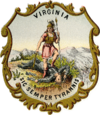Virginia in the American Civil War
| Commonwealth of Virginia | |||||
|---|---|---|---|---|---|
| Nickname(s): "Virginny" | |||||
|
|||||
| Capital | Richmond | ||||
| Largest City | Richmond | ||||
| Admission to confederacy | May 7, 1861 (8th) | ||||
| Population |
|
||||
| Forces supplied |
|
||||
| Governor |
John Letcher William Smith |
||||
| Senators |
William Ballard Preston Allen T. Caperton Robert M. T. Hunter |
||||
| Representatives | List | ||||
| Restored to the Union | January 26, 1870 | ||||
The Commonwealth of Virginia was a prominent part of the Confederate States during the American Civil War. As a slave-holding state, it held a state convention to deal with the secession crisis, and voted against secession on 4 April 1861. Opinion shifted after 15 April, when U.S. President Abraham Lincoln called for troops from all states still in the Union to put down the rebellion, following the capture of Fort Sumter, and the Virginia convention voted to declare secession from the Union. (In the Western counties, where there was little slavery, pro-Union sentiment remained strong, and they presently seceded from Virginia as a separate Union state, West Virginia.)
In May, it was decided to move the Confederate capital from Montgomery, Alabama, to Richmond, in part because the defense of Virginia's capital was deemed vital to the Confederacy's survival. On 24 May, the U.S. Army moved into northern Virginia and captured Alexandria without a fight.
Most of the battles in the Eastern Theater of the American Civil War took place in Virginia because the Confederacy had to defend its national capital at Richmond, and public opinion in the North demanded that the Union move "On to Richmond!" The successes of Robert E. Lee in defending Richmond is a central theme of the military history of the war. The White House of the Confederacy, located a few blocks north of the State Capitol, was home to the family of Confederate leader Jefferson Davis.
On October 16, 1859, the radical abolitionist John Brown led a group of 22 men in a raid on the Federal Arsenal in Harpers Ferry, Virginia. U.S. troops, led by Robert E. Lee, responded and quelled the raid. Subsequently, John Brown was tried and executed by hanging in Charles Town on December 2, 1859.
...
Wikipedia



